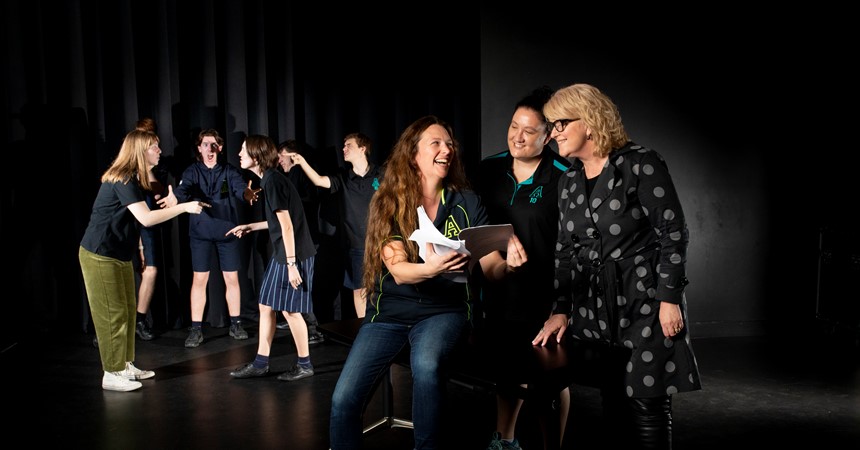Twelve years ago, longstanding Diocese of Maitland-Newcastle Creative Arts Co-ordinator Lisa Little saw a need. It was for a designated program that extended opportunities for gifted students in creative and performing arts beyond the school environment.
Mrs Little did something about it – she wrote a lengthy proposal. Then-director of schools in the Diocese, Ray Collins, embraced the program, but to do it well would cost money, and at that stage it couldn’t be funded.
Fortunately, Mrs Little was appointed to the Catholic Schools Office as a Senior Education Officer – School Improvement.
“The conversation from two years previous was then revisited,” she says. “Assistant Director Craig Wattam also came from a creative arts background and with the two of us on board it was a happy marriage. It is rare to have system leaders from the creative arts. It was serendipity really.
“Intuitively, Craig and I knew how to build it. We formed a committee of like-minded teachers and system colleagues, named it ASPIRE, and appointed a stellar group of staff. The rest is history.”
ASPIRE “launched” 11 years ago at San Clemente, Mayfield. “The launch set the tone and our expectations of excellence and reach across the Diocese,” Mrs Little says.
The first year was just a production and was staged in The Factory at St Pius X High School. It was an encouraging start involving about 80 kids. “We knew we had to think bigger as the calibre of students and the expertise of staff was self-evident,” Mrs Little says. “The following year we started at the Civic Theatre.”
ASPIRE as we now know it celebrates its 10th anniversary on 20 August. The audition-based drama, dance, music and creative and performing arts program provides a benchmark quality program for students from Years 5 to 11.
The program’s biggest triumph was the appointment of Anna Kerrigan as Artistic Director. She has provided the vision and direction that has expanded the program and enabled it to achieve the standards it set itself.
“We have always been unapologetic about excellence,” Mrs Little says. “That is why the annual production is audition-based and has enabled the expansion into other areas.”
There are now four arms to ASPIRE: an annual audition-based production; tailored in-school workshops and performance support for staff and students together with staff professional development; a second-tier non-audition-based program in theatre for seniors and juniors; and programs that develop students as songwriters
and scriptwriters.
ASPIRE encourages creativity and excellence in performance in the Diocese’s students and provides teachers with the skills to harness their students’ creativity. The innovative program is constantly evolving.
“The Civic production is amazing, and the songwriting and scriptwriters’ programs are incredible,” Mrs Little says. “To hear students from Year 5 saying ‘I wrote that’ and being accompanied by senior students on guitars and drums … it’s magic. Every week I see the process unfold and I’m still blown away by how much we grow each year.”
Ms Kerrigan is an inspiration in the schools. She can workshop something with small kids in the morning, script it, and they’ll perform it in the afternoon. The teachers watch and this builds their confidence as much as the students.
ASPIRE is recognised as a program for excellence in the creative and performing arts and a champion of the breadth of gifted education, but it’s also unique. Most organisations “buy in” a script; however, Ms Kerrigan writes a new, original script every year with input from ASPIRE students.
Productions are based on contemporary issues centred around young people, family and identity, always engendering a Catholic spirit that celebrates our humanity and innate gifts.
“The essence of what we do is extending the kids,” Mrs Little says. “These gifted performing arts kids often hide their light under a bushel. ASPIRE enables them to find their tribe. They find that space to be ‘that’ person.”
There is kudos involved for schools with students who make the ASPIRE cut. It requires tenacity and meeting exacting standards. There is a resilience to putting together an original piece of creative work, and lessons around collaboration. Hard work is its own reward.
To complement Ms Kerrigan’s efforts, ASPIRE has this year appointed a musical director, Jessica Lopez. She will grow the music component and build the capacity of teachers and students. The aim is for a diocesan-wide concert band and an expansion of the music component
of ASPIRE.
Mrs Little believes the reach of ASPIRE encapsulates the depth of Catholic education – celebrating the innate gifts of every student and respecting and acknowledging the dignity of the human person.
“What Anna writes every year is amazing,” Mrs Little says. “ASPIRE is an entity built on what we are about in this Diocese: a complete education and opportunities for all our students, and particularly the spiritual development of kids in the truest sense.”




























































































